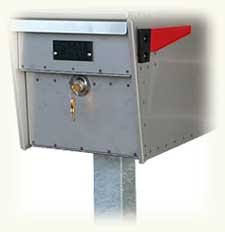 Mail
Fraud is considered to be a form of white collar fraud.
It is the oldest form of fraud that is lawfully regulated
and prosecuted by the federal government. The objective
of mail fraud is to achieve a desired result by trickery,
concealment, dishonesty and/or dicepetion, through
the use of the United States Mail Service or any other
private or commercial interstate carriers. The United
States Supreme Court has repeatedly upheld Congress
in the backing of this law.
Mail
Fraud is considered to be a form of white collar fraud.
It is the oldest form of fraud that is lawfully regulated
and prosecuted by the federal government. The objective
of mail fraud is to achieve a desired result by trickery,
concealment, dishonesty and/or dicepetion, through
the use of the United States Mail Service or any other
private or commercial interstate carriers. The United
States Supreme Court has repeatedly upheld Congress
in the backing of this law.
There are four elements that have been revised for
todays statutes against mail fraud that must be
met for a person and/or organization to be convicted
of mail fraud. An Assistant United States Attorney
(AUSA) must present sufficient evidence that when
submitted to a jury or judge would prove beyond
a reasonable doubt:
1. Such said defendant did knowingly create a scheme
to defraud;
2. Such said defendant did act out with the specific
intent to defraud;
3. Such said defendant did in fact mail something
or caused another person to mail something through
the United States Postal Service or a private commercial
carrier for the purpose of carrying out the scheme;
and
4. that the scheme to defraud employed false material
representations.
How have
the courts defined mail fraud violations?
A. If
you send false financial information through the
mail in order to retrieve or secure credit, knowing
that the information is in fact, constitutes violation
of 18 USC § 1341. Dranow v. United States,
307 F.2d 545 (8th Cir. 1962).
B. A plan where the defendant actually sold certificates
with the promise to pay twice the amount that was
paid, the defendant knowingly did not invest money
that was received and had no other income other
than that which was paid by the certificate buyers,
which was a scheme to defraud. Walker v. United
States, 152 F. 111 (9th Cir. 1907).
C. The writing or mailing of any letter by way of
carrying out scheme is acceptable, although the
letter or writing itself may have been harmless.
Byron v. United States, 273 F. 769 (9th Cir. 1921).
Possible
Penalties:
A person may be found guilty of a felony, sent to
prison for up to 20 years, and fined up to $250,000.
If a financial institution is involved, one may
be sent to prison for up to 30 years and fined up
to $1,000,000. The punishment is per transaction.
For example, if 5 letters are sent through the U.S.
Mail and 8 packages are sent through FedEx, the
potential punishment above is multiplied by 13.
Most
often, the State’s Assistant U.S. Attorney
(AUSA) will secure a Federal Indictment from a Federal
Grand Jury and charge a defendant not only with
mail fraud, but also with bank, wire and securities
fraud, money laundering, public corruption, or RICO
crimes and conspiracy to commit the aforementioned
crimes. One should also be aware that since 1987
parole has been abolished in the Federal System.
Expungement (removal of conviction from public records)
is also not available.
|

